
Last updated on August 23rd, 2022 at 06:41 pm
Inspection, detention and penal provisions of goods in transit
Industries have witnessed the faster and seamless movement of goods with the implementation of the E-waybill system. Mandatory use of FasTAG at toll plazas and abolition of check posts has resulted in quicker turnaround times for the movement of goods.
An E-way bill is generated online for the movement of goods where the value of goods being transported in a vehicle exceeds Rs 50,000/-. E-way bill provides the requisite information to the Government which can help the Government to track the movement of goods and check tax evasion if any.
Which documents are required along with vehicles for transportation of goods by road?
Section 68(1) of CGST Act 2017 states that the person in charge of the conveyance should carry the following prescribed documents:-
- Copy of e waybill (Physical form or Electronic form)
- Copy of invoice or bill of supply or delivery challan
Can a conveyance be intercepted?
Section 68(3) of CGST Act 2017 empowers proper officers to intercept any conveyance at any place,
- For verification of documents specified u/s 68(1)
and
- For inspection of goods.
Note: Proper officers will have to upload a summary report of the inspection of goods, conveyance, and documents in transit within 24 hours of the inspection in Form GST MOV – 02. The final report for the same shall be uploaded online within 3 working days of inspection in Form GST MOV – 04. [The above process of recording summary or final reports or issuing notice to the taxpayer is not being followed online (as on Jan 2022)]
Can the goods and conveyance carrying such goods be detained or seized?
Section 129(1) of CGST Act 2017 empowers the Proper officer to detain or seize while goods are in transit,
- If the goods are being transported in contravention of provisions of Act or Rules
OR
- If the goods are being stored in contravention of provisions of Act or Rules.
Then
- The above goods & the conveyance/vehicle carrying the above goods
AND
- The documents relating to the above goods (i.e. invoice/bill of supply/ delivery challan and e way bill)
are liable to be detained or seized by the proper officer.
Note: The statement of the person in charge of conveyance will be recorded in FORM GST MOV-01.
How the detained/seized goods & conveyance be released?
As per section 129(1)(a) – If the owner comes forward to pay & release the goods & conveyance
|
Nature of Goods |
Provisions up to 31.12.2021 | Provisions from 01.01.2022 |
| Taxable Goods |
100% of tax payable on such goods |
200% penalty of tax payable on such goods |
|
Exempted Goods |
Rs 25,000/- OR 2% of the value of goods whichever is lower |
Rs 25,000/- |
Note: As per section 129(1)(c) – The owner can also get the detained goods and conveyance released upon furnishing a SECURITY equivalent to the amount specified in sub-section 129(1)(a).
As per section 129(1)(b) – If the owner doesn’t come forward to pay & release the goods & conveyance
|
Nature of Goods |
Provisions up to 31.12.2021 | Provisions from 01.01.2022 |
|
Taxable Goods |
100% of tax payable on such goods AND 50% penalty of the value of such goods |
200% of tax payable on such goods |
| Exempted Goods | Rs 25,000/- OR 5% of the value of goods whichever is lower |
Rs 25,000/- |
Note: As per section 129(1)(c) – The taxpayer can also get the detained goods and conveyance released upon furnishing a SECURITY equivalent to the amount specified in sub-section 129(1)(b).
Does a taxpayer gets notice for the detention of goods and/or conveyance?
The proper officer who detains/seizes goods and/or conveyance will issue a notice specifying the penalty payable within 7 days.
Thereafter, after giving an opportunity of being heard the aggrieved party pass an order specifying the penalty payable within 7 days from the date of service of notice.
How many days are given to pay the penalty u/s 129(1)?
The amount of penalty shall be paid within 14 days from the date of receipt of the copy of the order which is passed after giving the taxpayer an opportunity of being heard.
When detention proceedings will be deemed to be over/ concluded?
As per section 129(5), when goods are released upon payment of tax and or penalty as specified u/s 129(1).
What happens if the penalty is not paid?
As per section 129(6), If the taxpayer fails to pay the penalty within the prescribed time limit then the detained goods or conveyance can be disposed off/sold off to recover the penalty payable after the period of 14 days for payment of tax and penalty lapses.
Note: If the detained goods are perishable or hazardous in nature then the goods can be disposed of even before the period of 14 days after obtaining prior permission from the proper officer.
Note: Transporter can come forward and get the detained conveyance released by paying lower of the following
- Penalty as per order u/s 129(3)
OR
- Rs 1 lakh
Recent Judgements in favor of the taxpayer where e way bill had expired
- 50th GST Council Meeting - 11/07/2023
- GST Compliance Calendar of October 2023 - 01/04/2023
- GST sections amended in Finance Act 2023 - 27/03/2023
Disclaimer: The above content is for general info purpose only and does not constitute professional advice. The author/ website will not be liable for any inaccurate / incomplete information and any reliance you place on the content is strictly at your risk.
Follow us on Social Media by clicking below
Follow @financepost_in
Be the first to comment